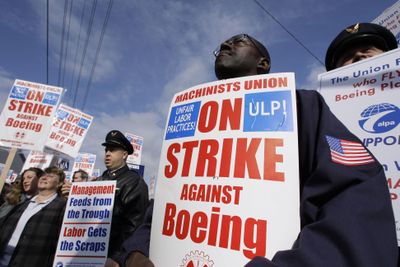Machinists’ leader reports tough talks
Boeing, union meet for first time since strike

SEATTLE – The Machinists’ union president said Monday that negotiators are having a “tough time” trying to end a five-week strike that has shut down Boeing Co.’s commercial aircraft factories.
Tom Buffenbarger said talks resumed on Sunday for the first time since 27,000 hourly production workers went on strike Sept. 6 over a raft of issues, including job security, pay, retirement benefits and health care. Some of thorniest disagreements to resolve are provisions on outsourcing and subcontracting.
Boeing has insisted that a free hand for management is imperative for the company to remain competitive.
Buffenbarger said he was ready to join the talks if needed but was not immediately headed for the table.
“To be very honest with you, I wish that they would do a deal without me,” he said.
In the past, major strikes by workers represented by the Machinists have been settled only with Boeing’s chief executive and the president of the International Association of Machinists and Aerospace Workers at the table.
Todd Blecher, a spokesman at Boeing headquarters in Chicago, said he could not say whether CEO W. James McNerney Jr. would join the talks, which at the direction of a federal mediator have been conducted under a tight news blackout.
Tim Healy, Boeing’s labor relations spokesman in Seattle, has similarly turned aside questions of whether Boeing Commercial Airplanes President Scott E. Carson would join the talks.
Buffenbarger would not disclose what issues have been discussed, but said he was getting regular briefings.
“They’re still having a tough time,” he said. “I still have to say, the fact that we’re talking is a good thing.”
Union officials say their members should at least have the right to bid against outside firms for work traditionally done by the Machinists, and they note that problems with subcontractors caused repeated delays in testing and delivery of the all-new 787 jet well before the strike.
The walkout has further pushed back that program, all but eliminating any chance of a test flight in the fourth quarter of 2008 as planned and risking further delays of deliveries to customers anxious for fuel-saving technologically advanced aircraft.
Analysts believe Boeing is losing $100 million or more in deferred revenue each day of the strike for a total approaching $4 billion. During a 28-day strike against Boeing in 2005, settled largely with retention of existing health coverage, the company delivered three planes and missed more than two dozen deliveries.
Union members are receiving $150 a week in strike pay, less than one-seventh of their average from Boeing. Buffenbarger has said those payments from the union’s $140 million strike fund, which continues to receive dues revenue from members in non-striking locals, could continue for five or six months.
He said the union would not accept a repeat of what happened during the Machinists’ 69-day strike in 1995, when a contract offer reluctantly recommended by union leaders was voted down shortly before Thanksgiving. A significantly richer offer was ratified less than two weeks before Christmas.